Nerva: ‘Pater Patriae’ – Aging Roman Emperor Who Succeeded In Time Of Crisis
A. Sutherland - AncientPages.com - Following the assassination of Domitian of the Flavian Dynasty (81–96) on September 18, 96, a new Emperor appeared on the same day. Domitian was succeeded by his friend and advisor Nerva, an aging senator with no biological children or known wives.
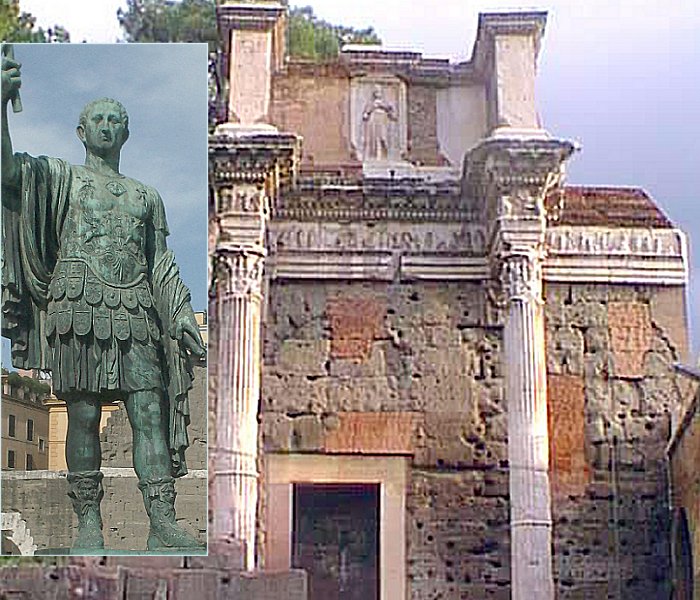 Left: Bronze statue of Nerva in the Forum Romanum, Rome. Image credit: Steerpike - CC BY-SA 3.0; Right: Rome, Forum Nervae, the "Colonnacce" (remains of columns against the internal wall of Forum Nerva. Image credit: Lalupa - Public Domain
Left: Bronze statue of Nerva in the Forum Romanum, Rome. Image credit: Steerpike - CC BY-SA 3.0; Right: Rome, Forum Nervae, the "Colonnacce" (remains of columns against the internal wall of Forum Nerva. Image credit: Lalupa - Public Domain
Nerva founded the long-lasting Nervan - Antonian dynasty, a strong dynasty of seven Roman Emperors who ruled over the Roman Empire from 96 to 192. These Emperors included Nerva (reigned 96–98 CE), Trajan (98–117), Hadrian (117–138), Antoninus Pius (138–161), and Marcus Aurelius (161–180), Lucius Verus (161-169) and Commodus (177-192).
The first five are commonly known as the "Five Good Emperors," benevolent rulers who demonstrated justice and restraint in their actions, producing the Empire's period of stability.
Who Was Emperor Nerva?
Nerva (Marcus Cocceius Nerva) was the son of a wealthy Roman lawyer and belonged to the Italian nobility. Like his family members, who successfully held high offices in the Republic and later in the early Empire, also Nerva lived as was expected in his family. He was born in the village of Narni (Umbria), not far from the city of Rome, on November 8, 30.
Despite the unrest in Roman society, Nerva became an official who always managed to get high posts.
Piso's Conspiracy Failed Because of Nerva's Intervention
He helped Emperor Nero (reign 54–68) resist Piso's conspiracy in 65. It was a plot organized by many conspirators, led by Gaius Calpurnius Piso, a leading Roman statesman and orator. Piso intended to have Nero assassinated, based on dissatisfaction with the dictator's rule and the growing discontent among the ruling class of the Roman state with his more and more despotic leadership.
The conspirators intended to kill the hated emperor with the help of his own side guard, the Praetorians.
As shown in the biographies of later emperors, the idea itself was not so bad. The Praetorians often became the cause of the overthrow of ruling emperors.
However, this time the conspiracy was discovered, and many Roman celebrities like the philosopher Seneca the Younger, his nephew, the Roman poet Lucan, and the satirist Petronius, had to pay the highest price. Nero ordered them to commit suicide. Many others were killed, exiled, or degraded.
What exactly was Nerva's involvement in detecting the plot is not known in detail. However, he received the so-called triumphal decorations (reserved mainly for military victories) as a reward.
Roman aureus struck under Trajan, c. 115. The reverse commemorates both Trajan's natural father, Marcus Ulpius Traianus (right) and his adoptive father, the Deified Nerva (left). Caption: IMP. TRAIANVS AVG. GER. DAC. P. M., TR. P., CO[N]S. VI, P. P. / DIVI NERVA ET TRAIANVS PAT.
Still, the question remains: was he eager for all these imperial insignia for himself (the conspiracy leader)? Maybe as Cassius Dio writes, the conspirators proposing his candidacy for a new emperor? According to Cassius Dio (155-235), a Roman statesman and historian of Greek and Roman origin, the conspirators approached Nerva as a potential successor before the assassination, which indicates that he was at least aware of the plot.
Nerva's Career Continues
Nerva did not harm his career because of his friendship with Nero. His political successes were already ultimately determined when he took the office of consul during the reign of Vespasian in 71 and later shared the ordinary consulship with Domitian in 90, which was very rewarding.
When the murder of Domitian became known, the Senate acted quickly and proclaimed Marcus Cocceius Nerva to be emperor. He had proven to be a capable statesman with political connections and an ability to negotiate. He was the ideal candidate for his flawless career as a tolerant and competent official.
Generosity That Weakened The Treasury Of Empire
Wanting to get even more support from senators, Nerva officially announced that no senators would be put to death as long as he remained in office. He called an end to trials based on treason, released those imprisoned under these charges, and granted amnesty to many exiled. These were the main reasons for the Senate's hatred of the former Emperor, Domitian.
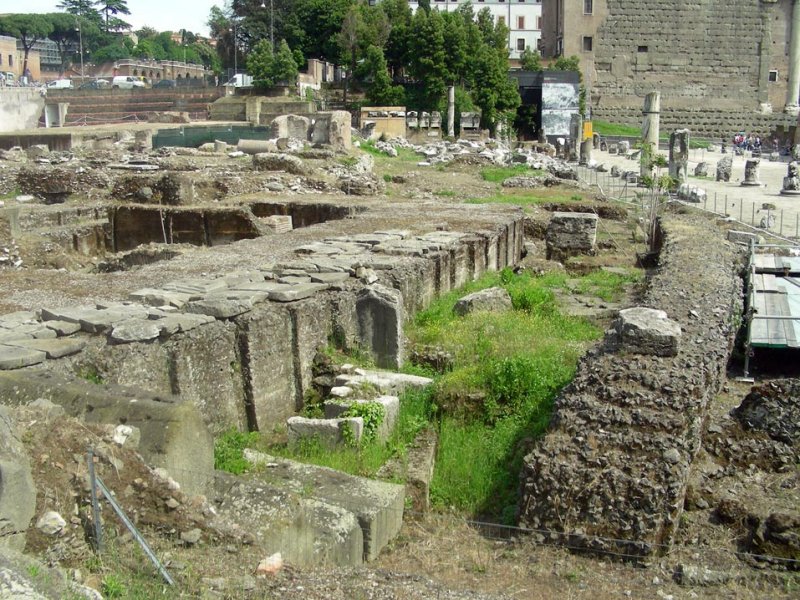 Rome, Nerva's Forum (Imperial Forums), remains of a temple foundation on short southwest side. Image credit: MM - CC BY-SA 3.0
Rome, Nerva's Forum (Imperial Forums), remains of a temple foundation on short southwest side. Image credit: MM - CC BY-SA 3.0
As was customary by this time, a change of emperor was expected to bring specific changes. At first, Nerva ordered that all statues and coins with Domitian's image be melted down, and his name was written off from all state documents. Being proclaimed emperor only on the initiative of the Senate, Nerva also had to win the support of the Roman people and give money to the people and the army. It was customary to provide citizens cash gifts - 75 denarii per head, while the soldiers of the Praetorian Guard received as much as 5000 denarii per person.
Nerva granted allotments of land worth up to 60 million sesterces to the poorest. He released parents and their children from a 5% inheritance tax. He made loans to Italian landowners on the condition that they pay interest of 5% to their municipality to support the children of needy families. The procedure was later expanded by Trajan, Antoninus Pius, and Marcus Aurelius.
However, Nerva's generosity weakened the treasury considerably to the extent that he was forced to limit the number of games and horse racing.
As he ruled for only fifteen months, he did not start many new public initiatives, focusing on completing the projects already initiated by his predecessors, such as the construction of the forum that began under Domitian and was later called the Nerve Forum.
He also extended the network of new aqueducts.
Wise Decision Made By Nerva
At the beginning of 97, a plot for Nerva's life was successfully discovered. It is worth noting that, even concerning the conspirators, Nerva upheld his original promise not to send senators to death.
However, he understood "that his feeble age could not stem the torrent of public disorders, which had multiplied under the long tyranny of his predecessor. The good respected his mild disposition, but the degenerate Romans required even more.
He adopted Trajan, then about forty years of age, who commanded a powerful army in Lower Germany; and immediately, by a decree of the Senate, declared him his colleague and successor in the Empire..." (Gibbon E. The History of the Decline and Fall of the Roman Empire).
By adopting the popular and respected Marcus Ulpius Trajanus (Trajan), as an heir in 97, Nerva made a clever choice that suppressed problems and earned Nerva the title Pater Patriae ('father of his country') as well as the right to live out the rest of his life in security and peace.
However, it wasn't very long– Nerva died just a few months later.
Written by – A. Sutherland - AncientPages.com Senior Staff Writer
Updated on December 17, 2022
Copyright © AncientPages.com All rights reserved. This material may not be published, broadcast, rewritten or redistributed in whole or part without the express written permission of AncientPages.com
Expand for referencesReferences:
Gibbon, E. The History of the Decline and Fall of the Roman Empire
Grainger John D. Nerva and the Roman Succession Crisis of AD 96-99
Grant, M. The Roman Emperors: A Biographical Guide to the Rulers of Rome
More From Ancient Pages
-
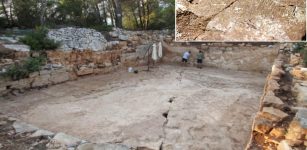 Excavations Of 2,500-Year-Old Water Cistern In Croatian Village Lumbarda – Completed
Archaeology | Oct 1, 2020
Excavations Of 2,500-Year-Old Water Cistern In Croatian Village Lumbarda – Completed
Archaeology | Oct 1, 2020 -
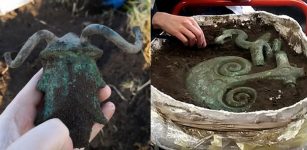 Mysterious Kallerup’s Double-Headed Figurine – Evidence Of Unknown Norse God Or Worship Of Roman God Janus In Ancient Scandinavia?
Artifacts | Mar 19, 2020
Mysterious Kallerup’s Double-Headed Figurine – Evidence Of Unknown Norse God Or Worship Of Roman God Janus In Ancient Scandinavia?
Artifacts | Mar 19, 2020 -
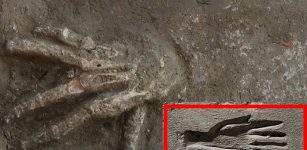 Mysterious Ancient Egyptian Severed Hands Practice Investigated By Scientists
Archaeology | Apr 1, 2023
Mysterious Ancient Egyptian Severed Hands Practice Investigated By Scientists
Archaeology | Apr 1, 2023 -
 Rare And Unexpected Celestial Phenomenon May Solve A Mysterious Pharaoh’s Ancient Secret
Featured Stories | Apr 10, 2025
Rare And Unexpected Celestial Phenomenon May Solve A Mysterious Pharaoh’s Ancient Secret
Featured Stories | Apr 10, 2025 -
 Irish God Ogma – Outstanding Warrior And Inventor Of The Ogham Script
Myths & Legends | Jul 3, 2024
Irish God Ogma – Outstanding Warrior And Inventor Of The Ogham Script
Myths & Legends | Jul 3, 2024 -
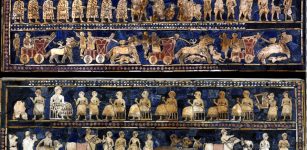 Image Of The Day: ‘The Standard of Ur – War And Peace’
Civilizations | Sep 7, 2015
Image Of The Day: ‘The Standard of Ur – War And Peace’
Civilizations | Sep 7, 2015 -
 On This Day In History: Vädersol Painting Depicting ‘Sun Dog’ Phenomenon Observed Over Stockholm – On Apr 20, 1535
News | Apr 20, 2017
On This Day In History: Vädersol Painting Depicting ‘Sun Dog’ Phenomenon Observed Over Stockholm – On Apr 20, 1535
News | Apr 20, 2017 -
 Ancient Brewing And Natufian Rituals – What Came First, Beer Or Bread?
Archaeology | Sep 14, 2018
Ancient Brewing And Natufian Rituals – What Came First, Beer Or Bread?
Archaeology | Sep 14, 2018 -
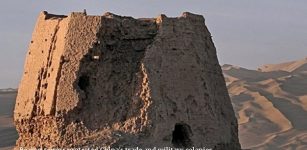 Nine Great Wall Beacon Towers Discovered In China’s Inner Mongolia
Archaeology | Apr 21, 2020
Nine Great Wall Beacon Towers Discovered In China’s Inner Mongolia
Archaeology | Apr 21, 2020 -
 How Henry VIII Accidentally Changed The Way We Write History
Featured Stories | Sep 6, 2024
How Henry VIII Accidentally Changed The Way We Write History
Featured Stories | Sep 6, 2024 -
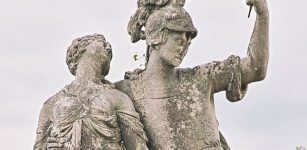 Tyrannical Tarquin The Proud: The Seventh And Last King Of Rome Was Banished
Featured Stories | Jan 28, 2020
Tyrannical Tarquin The Proud: The Seventh And Last King Of Rome Was Banished
Featured Stories | Jan 28, 2020 -
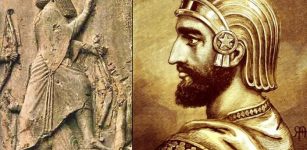 Murder Of Bardiya: Son Of Cyrus The Great And The Riddle Of The Impostor
Historical Figures | Dec 7, 2018
Murder Of Bardiya: Son Of Cyrus The Great And The Riddle Of The Impostor
Historical Figures | Dec 7, 2018 -
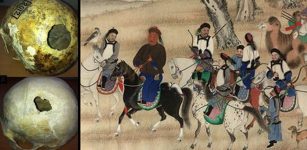 Siberia Had A Major Skull Surgery Center 2,500 Years Ago
Ancient History Facts | Jul 19, 2019
Siberia Had A Major Skull Surgery Center 2,500 Years Ago
Ancient History Facts | Jul 19, 2019 -
 Anne Askew: Woman Of Great Courage, Strong Beliefs And Principles Who Was Arrested For Heresy, Imprisoned, Tortured And Burnt At The Stake
Featured Stories | Feb 15, 2019
Anne Askew: Woman Of Great Courage, Strong Beliefs And Principles Who Was Arrested For Heresy, Imprisoned, Tortured And Burnt At The Stake
Featured Stories | Feb 15, 2019 -
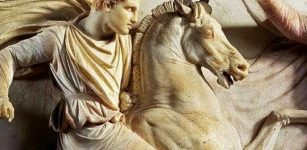 Why Was Alexander A Great Military Genius?
Ancient History Facts | Oct 23, 2018
Why Was Alexander A Great Military Genius?
Ancient History Facts | Oct 23, 2018 -
 Constructing Noah’s Ark – Re-Examination Of The Original Biblical Wording
Biblical Mysteries | Feb 1, 2018
Constructing Noah’s Ark – Re-Examination Of The Original Biblical Wording
Biblical Mysteries | Feb 1, 2018 -
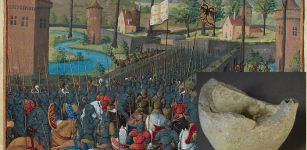 Ancient Hand Grenades: Explosive Weapons In Medieval Jerusalem During Crusades
Archaeology | Apr 26, 2022
Ancient Hand Grenades: Explosive Weapons In Medieval Jerusalem During Crusades
Archaeology | Apr 26, 2022 -
 Evidence Of Biblical Kingdom Of Edom In Arava Desert – Discovered
Archaeology | Sep 23, 2019
Evidence Of Biblical Kingdom Of Edom In Arava Desert – Discovered
Archaeology | Sep 23, 2019 -
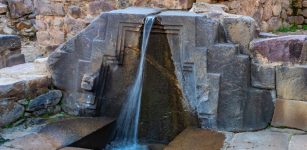 Incamisana Water Temple At Ollantaytambo, Peru: Marvelous Engineering Masterpiece Of Inca
Ancient Technology | Jul 19, 2019
Incamisana Water Temple At Ollantaytambo, Peru: Marvelous Engineering Masterpiece Of Inca
Ancient Technology | Jul 19, 2019 -
 Rare Early Bronze Age Axe Discovered In Slovakia
Archaeology | Jul 2, 2022
Rare Early Bronze Age Axe Discovered In Slovakia
Archaeology | Jul 2, 2022

![Roman aureus struck under Trajan, c. 115. The reverse commemorates both Trajan's natural father, Marcus Ulpius Traianus (right) and his adoptive father, the Deified Nerva (left). Caption: IMP. TRAIANVS AVG. GER. DAC. P. M., TR. P., CO[N]S. VI, P. P. / DIVI NERVA ET TRAIANVS PAT.](https://www.ancientpages.com/wp-content/uploads/2020/01/trajannerva1111.jpg)